-
Riffing With WRIF/Detroit, Part One: Forty Six PLUS Years of Rocking The Motor City
September 13, 2017
Have an opinion? Add your comment below. -



Before WRIF Was WRIF - WXYZ-FM
There are many heritage and influential Rock stations across America, but one station in particular has consistently featured top notch Morning shows, iconic market personalities and great Rock for 46 plus years. WRIF has been rocking and representing Detroit Rock City since 1971 and is still strong and relevant today.
While WRIF became WRIF in 1971, there was a radio station in Detroit on the 101.1 frequency before WRIF became the iconic Rocker we know of today.
According to our friends at Wikipedia, “101.1 FM signed on in 1948 as WXYZ-FM. For most of the station's early years, the station was simply a simulcast of WXYZ AM 1270 (now WXYT AM).” As a matter of fact, long time radio videographer and Michigan native Art Vuolo notes that “XYZ-FM used to go off the air from Midnight to 6am daily after the conclusion of the popular Lee Alan show from 7p-Midnight.”
Back then, FM Radio was still considered underground at best. That changed in 1966, when the FCC decreed separate programming for at least half of the broadcast day on FM stations that had been simulcasts of their AM sisters. WXYZ-FM separated programming and aired first a MOR/adult standards format, then later went to a rock-based Top 40 approach called “Boss 101” which featured mostly harder rock hits with little to no pop or soul product.
Then, According to WIKI, “in 1970, the station's then-owner, ABC made WXYZ-FM an affiliate of the ‘Love’ network that featured Brother John, a nationally syndicated underground rock format from ABC that predated today's satellite-fed radio formats (another ‘Love’ affiliate was sister WLS-FM in Chicago). WXYZ-FM hired at least one local jock for this format - Arthur Penhallow.”
101 WRIF
On Valentine’s Day (February 14), 1971, the station changed its call letters to WRIF. ABC had applied for WDAI (for Detroit Auto Industry) for WXYZ-FM, but the FCC assigned those to WLS-FM instead. The WRIF calls had been requested for WABC-FM in New York.
With legendary Rock consultant Lee Abrams at the helm, WRIF was a pioneer in the album-oriented rock format better known as AOR, utilizing many elements of late 60’s progressive rock radio while maintaining a tight, almost Top-40 style play list. Other ABC stations with a similar sound at that time included WPLJ/ New York and WDVE/Pittsburgh.
Like many of the original AOR’s back then, WRIF was not a pure rocker in its early years, smattering the likes of Top 40 staples KC & The Sunshine Band and the Bee Gees alongside rockers Alice Cooper, Traffic, and the Allman Brothers. After 1975, WRIF dropped most of the pop artists to concentrate on rock, but they would play a pop or disco song if it were extremely popular. The Bee Gees "Stayin' Alive," for example, got many spins on WRIF in 1977-78.
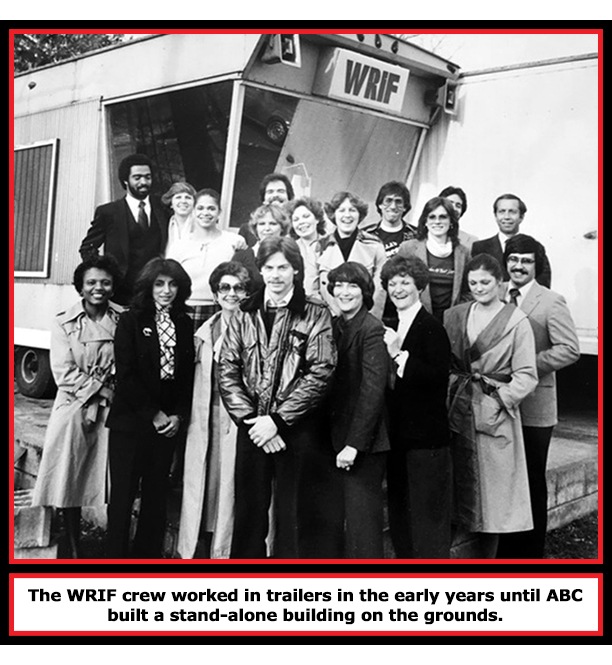
The 1980s was probably the decade in which there was the most change on the Detroit radio dial. A new rocker was installed on 98.7 FM, WLLZ "Detroit’s Wheels", and it proved so popular that it took out two other Detroit rock stations at the time. WWWW went country in 1980, and WABX changed to a CHR format called "Hot Rock" in 1983, and then went adult contemporary as WCLS.
But WRIF soldiered on, even though it was sold twice in the 80s and its rock format was on the chopping block more than once (rumors persisted in the late 1980s that the station was to switch to an urban contemporary format, especially after the debut of classic rock WCSX in 1987). In May 2006, WRIF outlasted yet another rock station but with a twist. 106.7 "The Drive" switched to country (this time as "106.7 The Fox") just as it did back in 1980 when it was known as "W4".
ABC continued to own WRIF until its merger with Capital Cities Communications in 1986. At that time, the station was spun off to Silver Star Communications. The next year, WRIF was sold to Great American Broadcasting (the former Taft Television and Radio, Inc.). Great American Broadcasting declared Chapter 11 bankruptcy in 1993, and subsequently reorganized as Citicasters Communications.
In the early 1990s, the FCC began to permit one entity to own two stations on the same band in the same market for the first time. As a result, in 1994, Greater Media, who already owned Detroit's classic rocker WCSX, purchased WRIF from Citicasters, and owned both stations until July 2016 when Beasley Media Group announced it would acquire Greater Media and its 21 stations (including WRIF). The FCC approved the sale on October 6, and the sale closed on November 1 of last year.
The WRIF PDs Dick Kernen 1971-1972 Lee Abrams 1972-1973 Larry Berger 1973-1974 Roger Skolnik 1974-1976 Tom Bender 1976-1981 Fred Jacobs 1981-83 Mark Pasman 1984 Michael Mayer 1985-1987 Pat Still 1987-1988 Marty Bender 1988-1990 Jim Pemberton 1990-1992 Greg Ausham 1993 to 1995 Doug Podell 1995 to 2009 Mark Pennington 2009 to present NOTE - some dates above are approximates 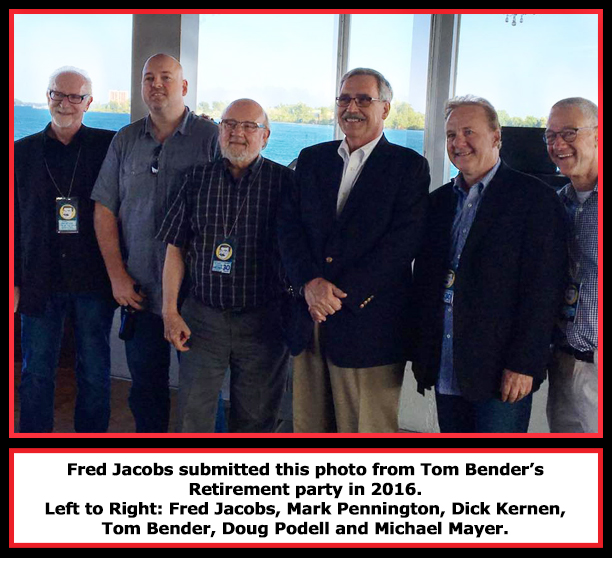


Dick Kernen - From The Beginning!
Dick Kernen is a native of Dearborn, MI where nearly everyone in town worked for the Ford Motor Company, except for him. As a teen, he noticed an ad for an “office boy for a radio station.” So in 1956 he broke into radio with ABC Detroit which included WXYZ AM and FM. He started out in the mail room and quickly moved up from there.
In the late 50s, when WXYZ AM went on to become a Top 40 station, Kernen spun vinyl for the AM as a “Board Op.” At that time, many FM stations were still simulcasting the content on their AM stations, but the FCC wanted radio owners to do something different than the AM’s or risk losing their FM license.
In the 60’s Kernen eventually moved up to Assistant PD for the AM, while XYZ FM was running ABC radio syndication. In 1968, the WXYZ GM made Kernen the PD for the FM. “He basically said, here kid, the FM is yours,” remembers Kernen. The FM was still running syndication until they eventually started hiring LIVE jocks.
“One of my first hires was this long-haired rock jock named Arthur Penhallow,” said Kernen. “This was around 1970, and soon after I hired many other long- haired leaping gnomes as DJs. We starting playing underground Rock with a live air staff.”
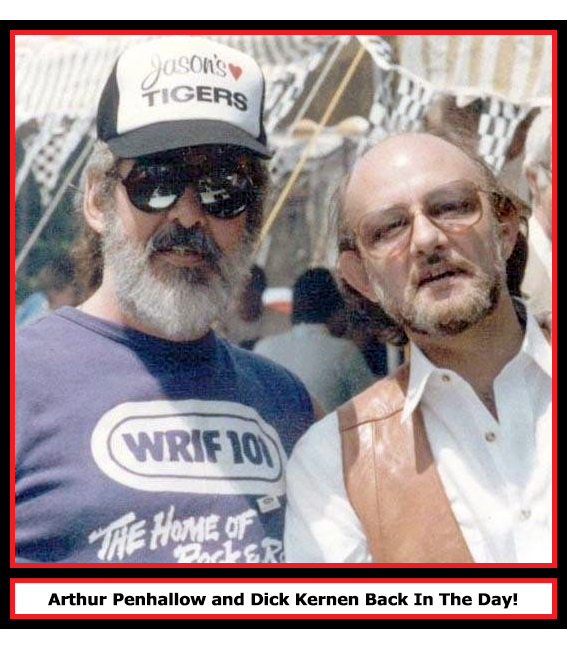
Allen Shaw was running all the ABC FM’s at that time and while most of these stations were playing some form of rock with some syndicated ABC FM shows like the Brother John show, the pressure was also on to completely do separate programming on each of the ABC FM’s.
Detroit was given the call letters WRIF and officially signed on with those calls on Valentine’s Day in 1971. WRIF eventually dropped all the ABC syndication and the first WRIF air staff was born featuring Hank Mallone in mornings and Arthur Penhallow in afternoons.
“As exciting as it was to be the PD of an FM station playing underground rock, I really didn’t like the managing people part,” said Kernen. So, after answering an ad for an “office boy for a radio station,” in the mid 50’s, Kernen left WRIF and was replaced by a young up and coming Rock Radio programmer named Lee Abrams.
“I had been at ABC for 15 years and it was time to do something else,” said Kernen. In March 1972, he landed at Specs Howard, a DJ school in Detroit, and has been there ever since. “I love the teaching aspect of radio, “says Kernen. “I started in the Admissions Department, but then went on to teach broadcasting. I’m really proud of the fact that to this day, the Specs Howard School of Media Arts places at least 70% of their students in the work force.”
Today, 45 years after leaving WRIF as their first PD, Kernen is still working for Specs Howard, in his role as their VP of Industry relations. He enjoys placing future radio talent in small markets all over the Midwest. But his most memorable radio placements to this day has to be that group of long-haired rock DJ’s he hired back in 1971 for that now iconic Rock station WRIF in Detroit!


Tom Bender - From Overnight Jock to GM!
Tom Bender was 18 when his family moved from Pittsburgh, PA to Detroit. In 1969, He landed a job working part time for XYZ- FM and did his own talk show. XYZ eventually flipped to WRIF and in 1974, Bender started doing overnights.
The WRIF PD at the time was Roger Skolnik who Bender didn’t always see eye to eye with. “Let’s just say I was Roger’s devil’s advocate,” remembered Bender. “Roger ran a tight ship musically, and I wanted to venture a little farther into album tracks.”
Bender’s strong minded opinions about programming paid off with Skolnik who, in 1976 would eventually leave for another gig in Chicago. Skolnik recommended Bender for the WRIF PD job to then GM Jack Minkow and the rest is history.
When Bender succeeded Skolnik in 1976, he was only in his late 20’s with no actual programming experience. The station was running the old ABC FM format which featured half rock singles and half album tracks. It was working. By late 1976 into early ’77, WRIF was the dominant Rock station in Detroit with an 8.0 share 12plus.
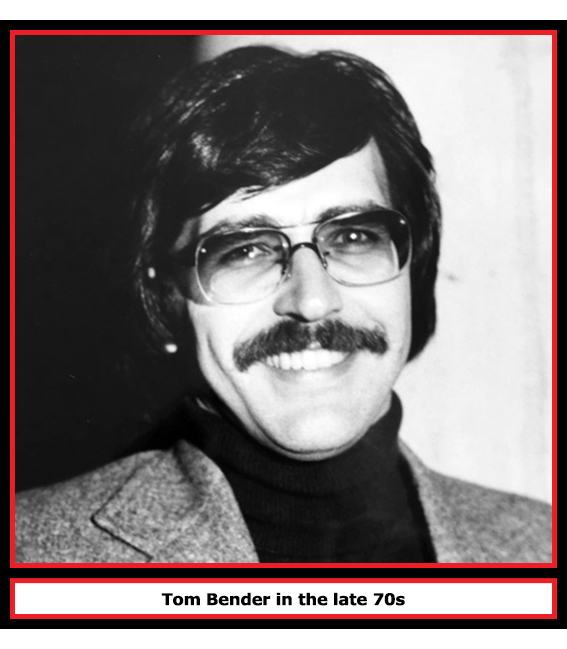
At this point, former WRIF PD/Consultant Lee Abrams was hired by crosstown rocker WWWW to install his so-called “Superstars” format playing tempo driven Hit Album Rock. WRIF was a loosely formatted album rock station then and a third Rock station, WABX, was playing underground progressive rock.
With W4 gaining momentum and ratings in the market, it was Bender’s idea to look a little deeper. “The ratings at the time were only one measurement of how we were doing,” said Bender. “What I really wanted to know was why Detroit listeners listened to WRIF or WWWW.”
When WRIF starting doing radio research in late 1977/early ’78, they hired the Magid Research company out of Cedar Rapids, IA to do a market perceptual study. The person from Magid who conducted the research study was Fred Jacobs.
“I remember working with Fred on this project which eventually turned into a large bound book of how the stations in the market were perceived competitively,” noted Bender. “Fred also started conducting focus groups for WRIF.”
Jacobs did such a great job with the research that Bender convinced WRIF that they needed to hire him full time. “We actually hired Fred as our Research Director and an Account executive,” laughed Bender. “That was the only way we could afford him.”
With dwindling numbers but a fresh research project in hand, with the help of Jacob’s research, Bender proceeded to blow up the station in 1978.
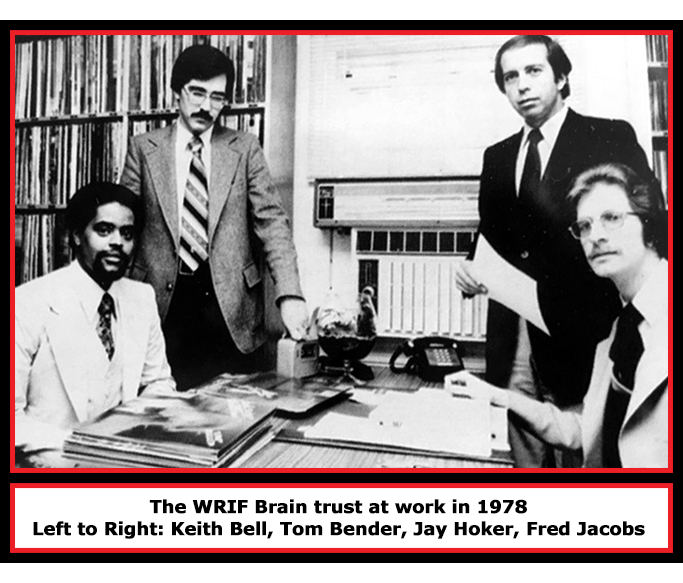
Michael Collins was doing a respectable job as the WRIF morning host back then, but in a matter of two weeks, everything changed at WRIF. Bender hired JJ (Jim Johnson) and the Morning Crew for WRIF from WWWW, Ken Calvert from both ABX and W4 to do middays and Karen Savelly from WABX for Nights. Arthur P remained in afternoons. Bender also, in his words, “Focused and tightened the music and rocked it out.”
They eventually marketed the station as well running the now famous Remarkable Mouth commercial featuring a run-down of WRIF’s music and personality attributes from the lips of actress-model Kelly Harmon. Kelly was also the daughter of the iconic University of Michigan football star Tom Harmon (also father of NCIS star Mark Harmon).
“We had a trade deal at the time to run the spots on our ABC affiliate Channel 7 (WXYZ TV),” said Bender. “We ran a ton of spots so it actually rained Remarkable Mouth spots in the Detroit market.”
The TV spot prominently displayed the famous WRIF Oval race track logo and with impressions through the roof, Bender knew he had a hit with his logo when Jacobs did a series of research projects after the spots had run. Bender recalled, “In several focus groups, Fred held up a blank logo with just the race track oval asking the participants to name the radio station, and nearly everyone said it was WRIF.”
That amazing listener WRIF recall prompted Jacobs and the station to start using just the oval sticker as a promotional gimmick, literally removing the WRIF call letters and replacing them with Band Names and other local or station benchmarks. The first one proudly displayed afternoon jock Arthur Penhallow’s famous “Baby.”

The new WRIF staff coupled with the marketing eventually got the station back on course with the 12plus ratings cresting at a 7.2 share. WRIF’s success was threatened again near the end of the 70’s into 1980 with the entrance of WLLZ (Detroit’s Wheels) implementing wall to wall music with a PD by the name of Doug Podell.
After a successful five year run, Tom Bender left WRIF in 1981, succeeded by Fred Jacobs, who took over as PD from doing corporate research out of NY for ABC. While Bender’s PD run at WRIF had ended in 81, in November 1986 he returned to Detroit to become the GM for WMJC (Magic), a struggling AC station for Greater Media. In March 1987, Magic morphed into Classic Rock WCSX.
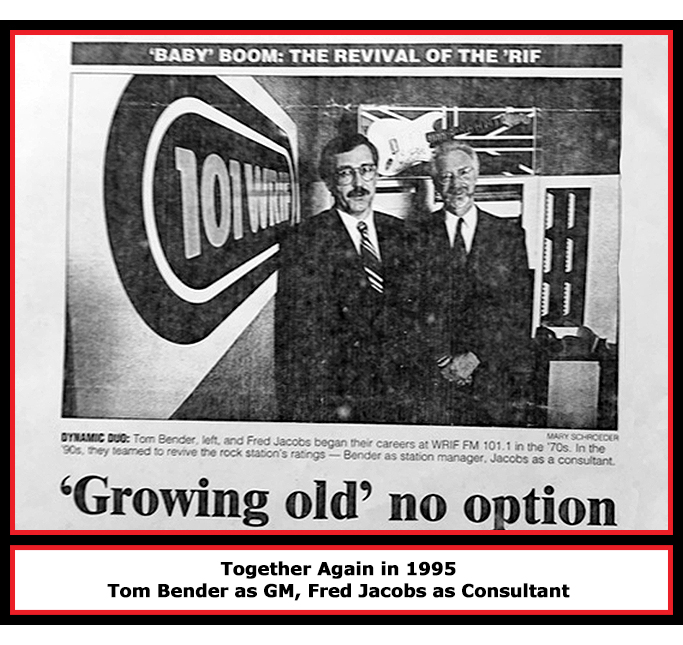
In 1991 Greater Media acquired WRIF from Great American, and Bender became GM of both WCSX and WRIF, the station he had programmed from 1976 to 1981. “It was great to reunite with WRIF,” said Bender. “It’s always been a special radio station to me.” Bender remained the GM until 2012, before taking on a corporate digital job for Greater Media. Bender retired from radio in 2016.


Detroit Is Just A Bigger Version Of Cleveland
While Tom Bender left his mark on the history of WRIF, another Bender also had a notable run at the legendary Motor City rocker. In 1988, Marty Bender was successfully programming WRIF’s Great American/Taft sister station WFBQ/Indianapolis. With the legendary Bob & Tom in mornings, FBQ was a Rock monster in the Midwest. At the time it was the highest rated AOR in the country.
Meanwhile, back in Detroit, WRIF was getting handily beaten by WLLZ, led by its PD Doug Podell, with its wall to wall music approach and heavy male bravado. Great American was having corporate programming meetings in the Midwest, when Bender recalls being whisked into a coat room by a corporate executive.
“It was pretty weird,” remembers Bender. “He had pointed to me in our meetings and said he wanted to chat privately. So he led me into a coat room closet when he asked me a question. ‘Hey Marty, you’re from Cleveland right?’ After responding yes, the executive continued. ‘Well we’d really like to transfer you to Detroit. We feel you can handle that town because Detroit is just a bigger version of Cleveland.’ Bender responded…’you mean like dirty, dying, snowy and segregated?’ He said, ‘yeah...like that.’”
Great American had plans for Bender. They wanted him to come to Detroit and rescue a very troubled WRIF. While Bender was hesitant at first, in 1988 he made the move from Indy to Detroit to program WRIF.
“The station needed a lot of work in both format basics and re-igniting its soul and spirit,” recalls Bender. He fixed the music, revved up the WRIF personality line-up, including what he considers a crucial move of filling the morning show hole with Ken Calvert. He even brought back the Remarkable Mouth TV spots that had been such a big part of WRIF’s success in the late 70s.
“We also had to remind Detroit Rock listeners who the real Motor City Rock station was,” said Bender. “The station had lost its way but the path back was really not that difficult to navigate as Detroit listeners who strayed were simply looking for reasons to come back.”

Bender also created a buzz in the market with some crazy concert events. “We actually put on a FREE Ray Charles concert in downtown Detroit. It didn’t matter to me that he wasn’t a rocker. It was Ray Charles, and listeners in Detroit thought it was cool that we were doing this.”
Within two years, Bender had brought WRIF back to its Rock dominance in Detroit. The company then needed him in Indianapolis as WFBQ had just gotten another Rock competitor. So Bender headed back to Indianapolis, his job in that ‘big version of Cleveland’ successfully completed.


WRIF's Foe, Then Friend
Doug Podell is from Detroit and proud of it. While he has spent time in a couple of other markets, the majority of his time in radio has been spent in his hometown.
In 1975, his first radio gig was doing weekends for Detroit rocker WABX. In 1976 he moved over to crosstown rocker WWWW to do a full time 10p to 2a shift. He eventually moved up to 6-10p which he held until the station flipped to Country in 1980.
After the W4 flip, Podell moved to Minneapolis to do the 6-10p shift and handle Music Director duties for KQRS. He was only there for exactly one year before Detroit came calling again.
Podell recalls, “Dave Hamilton was the PD for the Doubleday station KDWB/Minneapolis, and in 1981, when Hamilton eventually became the national PD for Doubleday, he hired me for the same 6-10p/MD duties for Doubleday’s Detroit rocker WLLZ.”
In 1985, Podell took over the WLLZ programming reins from Carey Curelop, who went back to Florida to program WYNF/Tampa. Podell went to work to strengthen WLLZ in its battle with WRIF. Shortly after he became PD, Podell stole the popular JJ and the Bruiser morning show away from WRIF. Podell had worked many years with JJ (Jim Johnson) at the old W4.
With JJ and the Bruiser moving to WLLZ, WRIF mainstays Ken Calvert and Lynn Woodison took over in the morning for WRIF. This morning show change created gridlock in the market. “From 1985 to 1990, it became a major battle between WLLZ and WRIF for everything,” remembers Podell. “We battled in mornings, and fought over promotions and music as well.”
After a strong five year run as PD at WLLZ, in 1990, Podell was approached by the legendary WMMS/Cleveland for a rare programming opening. “At the time WMMS was probably the #1 Rock station in America,” said Podell. “So I interviewed at WMMS and didn’t get the job, probably because I wanted too much money.”
When the GM at WLLZ asked Podell if he had interviewed at WMMS, he explained that he indeed had explored it. “It’s the #1 station in America,” said Podell. “The WLLZ GM was not happy about it and thought that my actions were unacceptable.”

It was about that time that Rock consultant Fred Jacobs called Podell. Jacobs was consulting Classic Rock WNCX/Cleveland and had remembered morning radio star Howard Stern recommending Podell. Prior to their flip to Country, Stern had been the morning guy at W4 when Podell worked there.
Podell ended up taking the job in Cleveland, but it took about a year for WNCX to finally sign up Stern for mornings. In 1991, with Howard in mornings, WNCX took off. “I built the radio station around Stern,” said Podell. “After his launch, there was lots of fall out in the market, and we eventually dismantled the legendary WMMS.”
So as promised by Stern, in the summer of 1995, he held a funeral in Cleveland for WMMS and all the other morning shows he had defeated in the market. “It was huge event,” said Podell. “I remember shortly after that funeral, getting a call from my consultant Fred Jacobs and one of his fellow consultants Andy Bloom. They were also consulting WRIF at the time. They asked me if I had any interest in returning to Detroit.”
Podell had to think about it. “You have to remember, my sights were always on beating WRIF,” said Podell. “They were the big dog. That’s who you had to kick. I never dreamed I’d have the opportunity to join them.”
In the Fall of ‘95 Podell returned to Detroit as WRIF’s PD. The longtime WRIF foe was now running the show. When Podell became PD, there was talk about bringing Howard Stern to WRIF, but they opted not too at the time.
“Drew and Mike were doing mornings for WRIF, “said Podell. “The consensus was to keep them in place, but forge our own Stern-like morning show. Drew and Mike were talented enough with their content that we played no music and gave them the freedom to do their thing.”
Market vet Trudy Daniels was brought in for News and the WRIF morning show was re-launched as a talk-rock ensemble show. It worked way better than they imagined.
Podell also remembers, “The late 90s was a musical hey-day for rock with the emergence of Grunge. We took advantage of it. We also played bands like Collective Soul and Creed and mixed it with heritage Classic Rock. It really resonated with Detroit.”
With Drew and Mike in mornings, Podell, a well-known Detroit personality himself, in middays, Detroit legend Arthur Penhallow in afternoons, as well as Meltdown in evenings and Screamin Scott for overnights, WRIF eventually became the market leader, even beating their Classic Rock sister station WCSX.
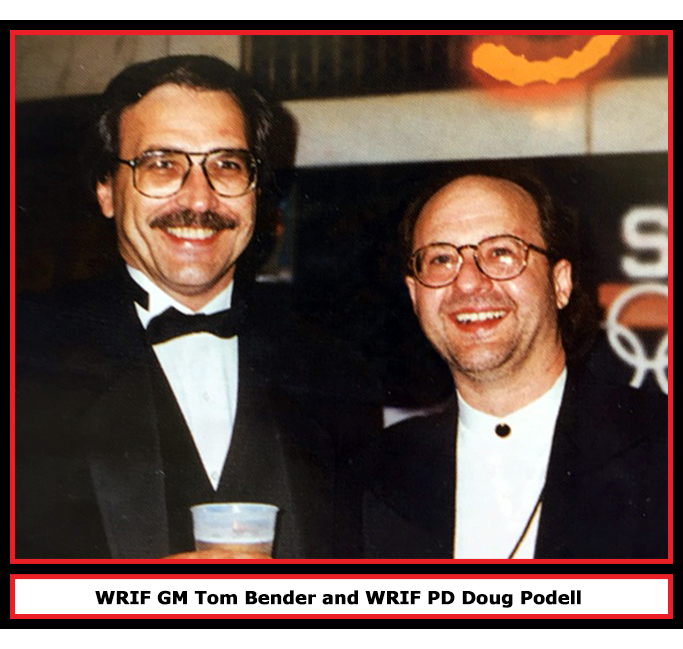
WRIF continued its successful run into the 2000’s with Podell programming and doing his midday shift. In 2008, Podell also took over the programming for WCSX. Greater Media preferred its PD’s focus on programming so he went off the air in December of that year.
In 2009, Domensky and Doyle were doing mornings for WCSX without much success, so at the end of that year, Ken Calvert moved from afternoons to mornings. Once again, the company called on Podell, the long-time Detroit personality, to return to afternoons on WCSX. Since the corporate policy preferred off-air PD’s, Podell had to choose one or the other.
In late 2009, Podell relinquished his successful programming run on WRIF to then APD/Music Director Mark Pennington, focusing on afternoons on WCSX. He’s been there ever since, still raising hell in Detroit, this time solely on the air.


Keeping The WRIF Legacy Alive!
Mark Pennington is from Zanesville, Ohio, just an hour outside of Columbus. His early days of radio included starting at WLVQ in Columbus and culminating in his position as APD/MD at his home states legendary rocker WMMS in Cleveland.
In 2002, Pennington took over the APD/MD reins at WRIF in Detroit from Troy Hanson who left for a programming gig in Miami. Pennington remained in that illustrious Off-Air APD/MD role under WRIF PD Doug Podell until late 2008 when Podell relinquished his programming duties to focus solely on Classic Rock sister station WCSX.
At that time, WRIF was in great shape with Drew and Mike in mornings, Anne Carlini in middays, Arthur Penhallow in afternoons and Meltdown in evenings. But shortly after Pennington officially got the WRIF PD nod in early 2009, an iconic WRIF personality was about to leave the station.
After 39 years on the air at the 101.1 frequency, first for WYZX and then 38 years for WRIF, Arthur Penhallow was leaving the station. This was quite a challenge for the new WRIF PD. But Pennington called on the deep resources of WRIF and moved Meltdown to afternoons from nights and Screamin’ Scott into nights from overnights.
An even bigger challenge for Pennington came in the Spring of 2013 when Drew and Mike, the long-time WRIF morning show, were not renewed. Since 1994, Drew and Mike had entertained Detroit in the morning for WRIF, and that was about to change.
Pennington called on Dave and Chuck “The Freak” to take over mornings on WRIF from cross-town Alternative rocker 89X. Pennington remembers “It was a seismic change in mornings for WRIF. For 20 years, Drew and Mike dominated in morning drive.
Dave and Chuck “The Freak” were achieving great success as well and had grown into a great team over the course of 10 years together.
So Pennington and WRIF made the move. “Both shows had their own blue element,” said Pennington. “But while Drew and Mike were brilliant at doing interviews and benchmark ‘bits,’ Dave and Chuck were much more interactive with their audience, relying very heavily on listeners calls to dictate the direction of the show, and much more active with social media as well. Their show offered a different mentality and way of thinking.”

Pennington also noted that Dave and Chuck brought nearly 100,000 Facebook followers and most of their 89X audience with them. It seems to be working. WRIF is currently #1 18-34, #1 18-49 and #1 25-54 in the market, and that’s not just the morning show. “We’ve been able to take that huge morning show cume and move it across all the dayparts,” said Pennington.
So as the WRIF audience got younger as a radio station, by design, the music got younger as well. Pennington re-formatted the music a bit but never lost track of the history of WRIF. “Our heritage is our blessing but at times can be a curse,” notes Pennington. “It allows for this huge cume that we have, but also makes it hard to make everybody happy. I always try to bring things back to the center.”
While WRIF is mindful of its heritage, Pennington notes that he treats WRIF and their Classic Rock sister station WCSX like two separate radio stations in the building. “We don’t play Hendrix and some older Classics that we could, and CSX doesn’t play much Guns N’ Roses or Motley Crue.”

WRIF also has a wealth of great local bands to choose from as well. “Kid Rock is HUGE for us and has 6 SOLD shows later this month at the new arena” notes Pennington. “On occasion we’ll even play a classic Ted Nugent tune or Bob Seger. We also play local and regional bands like Pop Evil, Citizen Zero and I Prevail.”
And then there’s hot new Michigan rockers Greta Van Fleet.
“I’ve known about Greta for the past two years,” says Pennington. “When I finally saw them live, they blew me away. Here’s this great young band playing throw-back rock, but it sounds new and refreshing. I know there’s that obvious comparison to Zeppelin, but they recently did a WRIF event for us and blew the doors off the club. They’re easily our most played new Rock band on WRIF!”
Playing great new rock has always been a core part of the history of WRIF. “I look for new bands that still have that ‘throw-back’ WRIF sound. Bands like Rival Sons and Black Keys really work for us. They’re still at their core, guitar based bands.”
Great new Rock bands will be on display at the first RIFF Fest coming up on September 29. “It’s the first time in a long time that WRIF has done our own music festival,” said Pennington. “We’re real excited about the lineup which includes Greta Van Fleet, Pop Evil, Halestorm, Five Finger Death Punch and Rob Zombie.”
Since 1971, WRIF has rocked Detroit and Mark Pennington knows the significance of his job as the latest programming leader of this iconic rock station. It’s a mission he’s proud to accept and one he continues to thrive in.
“After 46 years, the station’s heritage will continue to age itself naturally,” notes Pennington. “But we also have to take chances to stay young and relevant. As we continue to take on the challenge of both letting the listeners grow with WRIF and trying to keep a younger audience engaged, ultimately, it’s a delicate balancing act. If you take a chance on either end of it, you have to come back to the center.”
Thanks to a host of passionate and visionary programmers from Dick Kernen in the beginning to Mark Pennington today, WRIF continues to hold that special place in the “center” of the rock radio dial at 101.1 in Detroit.
Click here to read Part Two: Personality Goes A Long Way - The WRIF Morning Shows and Arthur P
-
-

